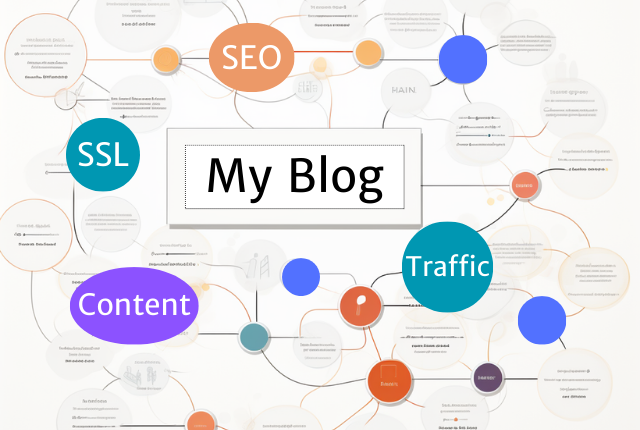Affordable Hosting for Bloggers
Creating an engaging and informative blog starts with finding the right hosting solution that’s both reliable and affordable. In this guide, we’ll dive into how you, as a blogger, can find the perfect hosting service without breaking the bank.
We’ll cover everything from understanding hosting basics to comparing types of hosting, and finally, how to make an informed decision that suits your blogging needs. Get ready for a deep dive into the world of affordable hosting for bloggers.

Understanding the Basics of Web Hosting
Web hosting is a service that allows individuals and organizations to post a website or web page onto the Internet. As a blogger, choosing the right web hosting service is crucial because it affects your blog’s accessibility, speed, and overall user experience. However, with so many options available, it can be overwhelming to find an affordable yet reliable service. Fear not, as we’re here to guide you through the process.
Before diving into the specifics, it’s essential to understand the key components of web hosting –
Domain Name: This is your web address (e.g., www.yourblogname.com). It’s how readers will find you online.
Web Hosting Service: This is where your blog’s files are stored, making it accessible to anyone online.
Content Management System (CMS): Platforms like WordPress, Blogger, or Joomla, help you manage and publish your content easily. More about CMS is below.
Types of Hosting Services
Shared Hosting: The most cost-effective option, where multiple websites share the same server resources. It’s an excellent choice for new bloggers or those with limited traffic.
Virtual Private Server (VPS) Hosting: A middle-ground option, offering more resources and customization options than shared hosting. It’s ideal for blogs with moderate traffic.
Cloud Hosting: Offers scalability by using multiple virtual servers to host a website. Perfect for blogs with fluctuating traffic.
Dedicated Hosting: The most expensive option, where you have a server all to yourself. It offers maximum control and performance and is suitable for high-traffic blogs.
Finding Affordable Hosting for Bloggers
Now that you’re familiar with the types of hosting, here are tips to find an affordable hosting service –
1. Determine Your Needs
Assess your blog’s size, expected traffic, and technical requirements. Starting with shared hosting might be the best choice if you’re new, with the option to upgrade as your blog grows.
2. Research and Compare
Look for hosting providers that offer the best value for money. Consider factors like uptime reliability, customer support, and included features such as backups and security measures.
3. Look for Deals and Discounts
Many hosting providers offer discounts for new customers or if you pay annually instead of monthly. Keep an eye out for special promotions.
4. Read Reviews
Check out reviews from other bloggers to get insights into their experiences with the hosting provider. It can help you avoid potential pitfalls and find a reliable service.
5. Test Customer Support
Before committing, test the hosting provider’s customer support. Quick and helpful customer service is invaluable, especially if you encounter issues with your blog.

Essential Features for Bloggers
When choosing your hosting service, ensure it offers –
One-click CMS Installations
One-click CMS installations are a game-changer for bloggers, especially those who may not have extensive technical expertise. This feature allows you to easily install popular Content Management Systems (CMS) like WordPress, Joomla, or Drupal directly from your hosting control panel, without the need for manually uploading files or configuring databases. Here’s why it’s crucial:
- Ease of Use: You can set up your blog within minutes, allowing you to focus on content creation rather than the technical setup.
- Flexibility: Easily experiment with different CMS platforms to find the one that best suits your blogging needs.
- Accessibility: This makes starting a blog accessible to everyone, regardless of their technical skill level.
SSL Certificate
An SSL Certificate is a digital certificate that provides secure, encrypted communications between a website and an internet browser. SSL stands for Secure Sockets Layer, and here’s why it’s indispensable for your blog:
- Enhanced Security: It protects sensitive information transmitted from and to your blog, such as login credentials and personal information.
- Trust and Credibility: Visitors see a padlock icon in their browser’s address bar, indicating that your site is secure, which builds trust.
- SEO Benefits: Google gives a ranking boost to HTTPS-enabled websites, so having an SSL certificate can help improve your blog’s visibility in search results.
Adequate Storage and Bandwidth
Storage refers to the amount of space available on a server for your blog’s files, such as HTML files, images, videos, and emails. Bandwidth is the volume of data that can be transferred to and from your blog within a given period. Here’s why they’re important:
- Scalability: As your blog grows, you’ll need more storage for content and bandwidth to handle increased traffic without slowing down your site.
- Performance: Adequate bandwidth ensures that your blog loads quickly for visitors, improving user experience and engagement.
- Cost Efficiency: Some hosting providers offer scalable solutions, so you only pay for the storage and bandwidth you use, which can be cost-effective for growing blogs.
Automatic Backups
Automatic backups are copies of your blog’s data that are created and stored automatically by your hosting provider at regular intervals. This feature is vital for several reasons:
- Data Protection: In case of a technical glitch, hacking, or accidental data deletion, having up-to-date backups means you can restore your blog to its previous state.
- Peace of Mind: Knowing that your blog’s data is regularly backed up automatically provides peace of mind, allowing you to focus on creating content without worrying about data loss.
- Time-Saving: Automatic backups eliminate the need for manual backups, saving you time and ensuring that backups are always current.
Finding the Right Hosting
Finding the right hosting service is a critical step in your blogging journey. By understanding your needs, doing thorough research, and carefully comparing your options, you can find an affordable and reliable hosting solution that meets your blog’s requirements.
When looking for affordable hosting providers there are several reputable companies that offer great service at competitive prices. Here’s a list of some alternatives that are well-regarded in the hosting industry for their affordability, reliability, and range of features suitable for bloggers –
SiteGround – Known for excellent customer support and high-performance hosting, SiteGround offers managed WordPress hosting, free SSL certificates, and daily backups.
DreamHost – Offering a 97-day money-back guarantee, DreamHost provides great value with their shared hosting plans, which include a free domain, SSL certificate, and privacy protection.
A2 Hosting – A2 Hosting is renowned for its speed and reliability. They offer a variety of hosting types, including shared, VPS, and dedicated servers, with a focus on optimizing for WordPress.
InMotion Hosting – With a strong emphasis on customer service, InMotion Hosting offers a range of hosting options that include free SSL, unlimited bandwidth, and a free domain.
GreenGeeks – As an eco-friendly hosting provider, GreenGeeks not only offers competitive pricing and solid performance but also commits to putting back three times the power they consume into renewable energy.
Namecheap – Initially known for domain registration, Namecheap also offers affordable hosting with strong features, including free domain and privacy protection for the first year, free SSL certificates, and a 30-day money-back guarantee.
HostPapa – HostPapa is a great choice for small businesses and bloggers looking for a balance between affordability and features, offering free domain registration, SSL certificate, and 24/7 support.
Cloudways – A managed cloud hosting platform that lets you choose from five top cloud providers, including DigitalOcean and AWS, with pay-as-you-go plans that are ideal for bloggers looking for scalability and performance.
I will usually only post companies that I or my team have or are currently using. However, on this occasion, I have not used Namecheap, HostPapa, or the Cloudways service. But from other reviews and anecdotal evidence for direct users, I am including them as they offer a service that is affordable and reliable.
Each of these providers has its unique strengths, so it’s important to assess your specific needs, such as the type of content you plan to host, expected traffic, and your technical proficiency, before making a decision. Always check the latest plans and features directly on the providers’ websites, as offerings and prices can change.
You want your blog to be seen by as many people as possible and it can only be done when you have a host that is fast and reliable. When choosing a hosting provider for your blog, it’s essential to consider these features not only for the immediate benefits they provide but also for the long-term success and growth of your blog. They collectively contribute to a secure, user-friendly, and scalable blogging platform, enabling you to create, share, and engage with your audience effectively.




